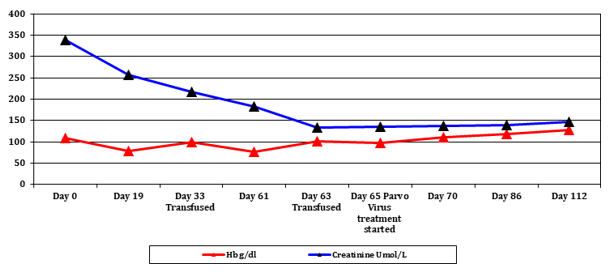
Parvovirus Causing Severe Anaemia In Kidney Transplant Recipient. A Case Report
Shafiq Ahmad SAC Chughtai 1, Binay BG Gurung 1, Anna AR Rizzello1, Tahir TD Doughman1, Atul AB Bagul1.
1Transplant Surgery, Leicester General Hospital , Leicester , United Kingdom
Introduction: Mortality is 6 times higher in mild and 10 times higher in severe anemia amongst renal transplant recipients.Parvovirus infection is known to cause 1-12% symptomatic B19 infection with in first year post transplant. Here we present a case of severe anaemia secondary to B19 parvovirus infection after kidney transplantation.
Case Scenario: Our patient was a 69 years old female, pre-dialysis with end stage renal disease of unknown aetiology. She underwent successful standard immunological risk transplant from a DCD donor in 60s. Her haemoglobin (Hb) at the time of transplant was 120 g/dl.
On post-operative day 19, she was admitted with lethargy and Hb of 78g/dl. Baseline investigations including Iron, Serum Folate, Vitamin B12 and Transferrin were normal. Her reticulocytes count was low and ferratin levels were markedly elevated (2196 umol/l). Patient declined consent for gastro intestinal tract endoscopy. She had two units of blood transfused.She was readmitted on post op day 61 with Hb of 76g/dl and had further blood transfusions.B19 IgG antibody was detected in serum and DNA PCR showed viral load of 1.2 billion IU/ml. She was treated with 5 days of intravenous immunoglobulin (IVIG). Mycophenolate Mofetil was reduced (MMF) to 250 mg BD from 500 mg BD. Her subsequent results showed improving Hb (127 g/dl) and falling B19 viral load (6360 IU/ml on DNA PCR).
Discussion: Low Hb is an independent risk factor for graft failure and mortality. Transfusion increases donor specific antibodies and episodes of antibody mediated rejection.Parvovirus causess apoptosis in erythrocytes progenitor cells.The mode of transfusion is commonly via respiratory tract.The utility of serological testing in B19 infection is limited due to immunosuppression. We use serology and DNA PCR quantification to di
agnose B19 infection. Parvovirus specific antiviral therapy is not available. Intra venous immunoglobulin (IVIG) is known to be effective in transplant recipients. Optimum dose and duration is not clear however 400mg/kg /day is commonly used for 5 days which was used in our patient.
Conclusion: Anaemia in transplant recipient results in higher mortality, poor graft survival, higher sensitization and increased hospital admissions. We suggest that Parvovirus should be routinely investigated in all cases of anaemia post kidney transplantation, particularly when other common causes are excluded.
